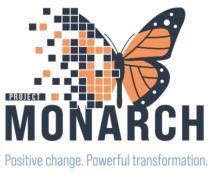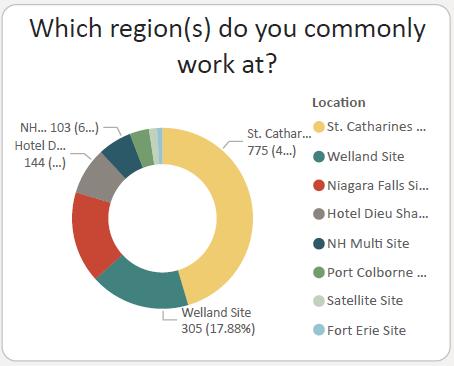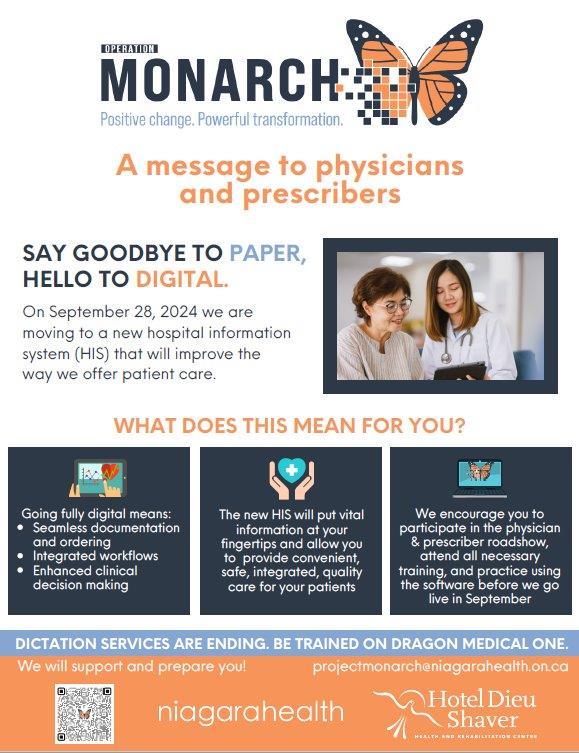














This is the fourth in a series of Operation Monarch Change Agent Playbooks that are available to you to use as a source for up-to-date project updates, key messages, communication strategies and other relevant information to support you in communicating to your colleagues as we move through the implementation of a new HIS
As a Change Agent, your role is necessary as a transformational driver in communicating important project awareness and understanding the impact a new hospital information system (HIS) will have on your teammates.
This playbook will provide Sponsors and Accountable Leaders with information on:
• Operation Monarch timeline review
• Pulse Check Outcomes
• Training Timeline
• Super User Strategy
• Readiness and Engagement Activities
• Change Agent Action plan



One notable change in the timeline is the shift from using the term ‘Project Monarch’ to ‘Operation Monarch’. This shift is meant to demonstrate the project initiative as a corporate priority across both organizations. Using the term Operation Monarch signals to our teams that while we continue in the engage phase, we have entered the training and testing phase of the project. The next stage if the project is the activate stage which will begin at go-live on September 28th , 2024. Following go-live we will move into the measure stage which will include optimization, sustainment and measurement activities.


The white background depicts the activities in the timeline that have been accomplished to-date. The blue section is the journey to go-live leading up to optimization and stabilization. The dashed yellow line depicts the project journey to go-live.


Oracle’s Learning Framework delivers role-based learning content for end users prior to using Oracle solutions. Learning content is based on model experience and is delivered through a learning portal where learning progress and readiness indicators such as competency, commitment, and confidence are tracked.
Training curriculum is conducted in stages which consists of role-focused asynchronous, virtual, mobile friendly, learning activities and an instructor-led session with a competency evaluation. Successful completion of the Learning Journey leads to access to the HIS.
End users receive their own role-based learning journey distributed at a 5-week cadence. Users are guided along a learning path that is divided into stages with learning activities specific to each stage
Stage 1
•Discover
Stage 2
•Explore
Stage 3
•Explore
Stage 4
•Perform
Stage 5
•Adopt
•/Reinforce
Learning labs will be conducted at various Niagara Health sites and Hotel Dieu Shaver. The in-class training sessions offered from August 6th – September 27th, 2024. Learning labs will be:
• Facilitated by Oracle Health Training Specialists
• Hands-on learning
• Labs will be between two and 16 hours in length (length is role dependent)
o 16-hour session will be conducted over two days
• The Training team is coordinating end-user training requirements with managers and supervisors
• Favourites Fair and Login Labs will be scheduled to ensure logins are ready prior to go-live
Below is a timeline for training and learning opportunities:



A Super User Program is imperative to the success of Operation Monarch. Having knowledgeable, visible Super Users embedded within every unit will ensure a smoother, more efficient Go-Live.
Operation Monarch will need super users from each organization, every site and all program areas including representatives from as many roles as possible - e.g. - physicians/prescribers, clinicians, allied health, unit clerks, and staff from ancillary services.
Best practices recommend a minimum of 1 super user for every 10 users, or one Super User per unit.
Super users:
• Dedicated resources from each unit, supporting their colleagues and peers for the duration of go-live.
• Will be able to troubleshoot basic issues and escalate any issues that they are unable to resolve to Operation Monarch project resources
At-the-elbow supports (ATE):
• Resources hired from outside of NH & HDS to support end-users during go-live (e.g. co-op students, contracted resources)
• The use of peers from both HDS and all NH sites in this role is essential.
• Utilizing Super Users that end-users already know is likely to make them more approachable and will aid in building a local knowledge pool, which will assist in the long-term sustainability of Operation Monarch.
• By building up confidence and experience at HDS and NH sites (or within the organizations overall), it greatly improves the success of go-live, and especially the transition to sustainment
• Millennium will require frequent upgrades, bug fixes and enhancements on an ongoing basis. By building an internal Super User “community of practice”, they can continue to stay up to date on all changes and will become change conduits for keeping their peers informed and feeling supported.
Super users will receive enhanced training and be equipped to help their colleagues learn how to use the new system. Other benefits include:
• Enhanced system knowledge - Super Users will gain an in-depth understanding of the Millennium platform.
• Professional Growth and Recognition - Being a super user demonstrates commitment to advancing the effective use of healthcare technology.
• User Training and Support - Super users often take on the role of trainers, educating and supporting colleagues.
• System Optimization - Super Users will have the opportunity to provide feedback and suggestions for system improvements
• Increased Productivity - Super users are trained to troubleshoot and resolve issues in Millennium. This expertise empowers super users to quickly address questions and concerns minimizing downtime and disruptions.

A Super User is more than a technical resource, these individuals have many difference attributes that enhance their role supporting their colleagues.


The Super User program will be organized into four phases: Recruitment, Training, Go-Live, and Sustainment.

Recruitment
• Based on initial analysis, it is anticipated that Operation Monarch will require ~188 Super Users for the duration of go-live support (approximately 4 weeks)
• Users who are interested in being a Super User should respond to the Expression of Interest request to be shared March 2024.
• End-users are requested to copy their managers or supervisors of their interest.
Training
• Super Users will be required to attend all relevant End User Training including Learning Journeys (rolebased online training), Outreach Opportunities (e.g. huddles, roadshows, department meetings), and Learning Labs (in-person classroom training).
• They will be encouraged to join a second classroom session to observe and support an instructor with learners, and to participate in readiness/practice opportunities (e.g., shadow charting, simulations)
Go-Live
• Super Users will provide support for their peers and colleagues and will be easily identified via provided clothing (e.g. T-shirts or vests).
• Ideally, Super Users will not have a patient assignment or other responsibilities.
• For issues beyond the scope of the Super Users knowledge, there will be a robust escalation process in place where Operation Monarch resources will be able to provide more advanced support.
• As part of the go-live, a subset of Super Users may also be asked to participate in cutover activities.
• In the week leading up to and including the night of go-live, several users at each site will be required to cut-over bedded patients into the new system.
• Super Users are ideal candidates for this work as they will have received additional training and will not have to balance patient care at the same time
Sustainment
• The Monarch team will strive to build a “community of practice” for Super Users after go-live.
• More information will be shared as it becomes available.

The readiness plan is a multi-pronged approach to build up foundational knowledge related to the technical functionality and terminology of the new HIS.
This readiness timeline showcases the different venues that are planned for the practice readiness such as, leadership forum, roadshows, open houses, lunch and learns, program and huddle in-service rounding, and post training practice opportunities. The purpose is to support our front-end users to become self-efficient and perform with confidence as an essential element to providing quality patient care at go-live.
There are three considerations for readiness:
• What’s changing? How can you support leading your team through the change? How can Operation Monarch support your program during this change?
Below is a timeline for the readiness activities. Announcements and invitations to these events will be sent out as appropriate for each leader or end user.


As a change agent, one of your major roles is to be a communicator for the change with your colleagues. The ©Prosci, Inc. Methodology proposes an ADKAR model to help us in communicating. The five steps are listed below with tangible ideas to drive your change messages.
Using this model, aids us in achieving successful change by creating a lens for viewing change. The ©Prosci, Inc. methodology encourages action driven messaging that addresses how change happens while bringing in “what’s in it for me” statements.




Project Monarch key messages can be found on Operation Monarch SourceNet page or Hotel Dieu Shaver’s E-Span page.



Total number of respondents = 1706 across both organizations and all Niagara Health sites.










Operation Monarch SourceNet page (NH)
Operation Monarch E-span page (HDS)
Refer to the FAQs on SourceNet (NH) or E-span (HDS)
Email Operation.Monarch@niagarahealth.on.ca
SourceNet (NH) Feedback form
E-span (HDS) Feedback form
References:
1. Change Management: The People Side of Change; J.M. Hiatt, T.J. Creasey, Second edition, 2012
2. Best Practices in Change Management: 10th Edition; Prosci Inc., 2018.
3. Leading Change, J. Kotter, 2012